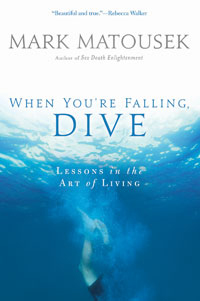
Why do some people radiate goodness and hope? Is there a biological basis for what makes us good?
I put this question to Daniel Goleman, the bestselling author of "Emotional Intelligence" at a Tibetan restaurant in Northhampton Massachusetts. "Emotions are contagious, first of all," Dan says, popping a morsel of yak sausage into his mouth. "We're actually catch each others' feelings like a cold. When we're in toxic relationships, this has actual physical consequences. When we're in positive relationships with people who make us feel good, this change our body chemistry for the better. You could say that there's a science to goodness."
"A science of goodness?"
"Absolutely," says Dan with a smile. He first learned this as a Harvard post-doc, studying meditation in India three decades ago. There, he noticed that seasoned meditation practitioners tended to exude what Dan calls "a special quality, magnetic in a quiet sense." Contrary to stereotype, these spiritual types did not seem otherworldly at all, but were "lively and engaged, extremely present, involved in the moment, often funny, yet profoundly at peace -- equanimous in disturbing situations. What's more, this quality was communicable, he noticed. "You always felt better than before you'd spent time with them," Dan tells me. "And this feeling lasted."
Physicists and mystics agree on this point. The components of altruistic energy appear to be as measurable as photons and electrons, and are more palpable than a skeptic might imagine. One such skeptic, San Francisco psychologist Paul Ekman, found this out for himself after spending a week in Dharmsala with the H. H., the Dalai Lama.
"At the airport afterward, my wife looked at me and said, 'You're not the man I married!'" Ekman (who is not a Buddhist) tells me with a laugh. "I was acting like somebody who's in love." The foremost authority on the physiology of emotion, Ekman detected four characteristics common to people with this contagious power of goodness.
"A palpable goodness, first of all, that went far beyond some warm and fuzzy aura and seemed to arise from genuine integrity." Next, there was an impression of selflessness - a lack of concern with status, fame, and ego - a "transparency between their personal and public lives that set them apart from those with charisma, who are often one thing on the outside, another when you look under the surface."
Third, Ekman observed that this expansive, compassionate energy nurtured others. Finally, he was struck by the "amazing powers of attentiveness" displayed by these individuals, and the feeling he had of being seen in the round, wholly acknowledged by someone with open eyes.
If these qualities were unique to spiritual masters, they wouldn't be nearly as compelling. What inspired Ekman-the-scientist was the evidence that such energy is available to the rest of us. "It wasn't luck or culture or genes that created this qualitative difference," he tells me. "These people have resculpted their brains through practice." In a laboratory outside Raleigh-Durham, North Carolina, a monk was monitored a few years back while meditating on compassion. Among other findings, scientists reported a dramatic increase in gamma waves (sparked in the part of the brain associated with positive emotions), while the monk focused on keeping an open heart.
We can cultivate goodness, in other words, through gamma-bumping practices of various kinds - from meditation, prayer, and public service, to communing with nature, emotional intimacy, and creating art. "Everybody can draw, but not everybody's a Picasso," one healer tells me. "Some days you can't even find the canvas. But the source of goodness is always within you. You just have to keep tapping in."
From his hermitage in upstate New York, 83-year old Benedictine monk David Steindl Rast agrees. "It is our daily dilemma" Brother David insists. "A spiritual energy flows through the universe, a super-aliveness - an active yes. Yet even though our greatest happiness comes from feeling this eternal connection, there's a tendency in all of us to close off from it. Those who counteract the tendency through practice deepen their sense of belonging and free this latent energy."
In order to do so, Brother David recommends a simple practice: counting our blessings. "When we say 'count your blessings,' this is a very profound teaching," he says. "A stream of energy - of blessing - is flowing from the universal source as blood pulsates from the heart. Knowing this, I'm energized and pass the blessing along to my brother so it flows again to its source. We create a network of grateful living."
This sounds a lot like the practice of love, I say. "It is love," Brother David assures me. "The love which passes understanding."
This force could radically change the world, melt away borders, give hope for greater happiness. Another great Christian, Teilhard de Chardin, articulated this hope for all time:
"Someday after we have mastered the winds, the waves, the tides, and gravity, we shall harness....the energies of love," the French paleontologist-priest wrote. "Then for the second time in the history of the world, man will have discovered fire."